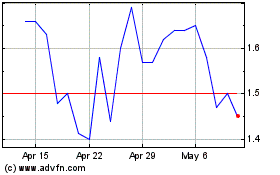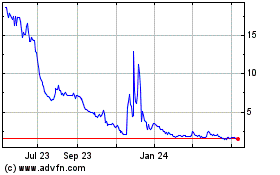Altamira Therapeutics Announces Significant Enhancement of Immune Checkpoint Inhibition Therapy in Combination with Zbtb46 mRNA Delivered with SemaPhore Nanoparticles in Animal Tumor Models
12 August 2024 - 11:02PM

- Treatment with ZbtbB46 mRNA nanoparticles based on Altamira’s
SemaPhore™ delivery technology results in significant reduction in
tumor growth (p<0.0001)
- Combination of nanoparticles with immune checkpoint inhibitor
(anti-PD1) shows even more pronounced improvement, synergistic
control of tumor growth with long-term complete remission of tumor
in many cases
- Combination therapy may help to render more solid tumor
patients responsive to anti-PD1 therapies (immune checkpoint
inhibitors)
- Results published in Nature Immunology, one of the world’s top
immunology journals
Altamira Therapeutics Ltd. (“Altamira” or the
“Company”) (Nasdaq:CYTO), a company dedicated to developing and
commercializing RNA delivery technology for targets beyond the
liver, today announced the publication of a peer-reviewed article
in Nature Immunology highlighting the important role of the Zbtb46
gene in the control of tumor growth and demonstrating a significant
reduction in tumor growth in vivo through treatment with Zbtb46
mRNA delivered with Altamira’s SemaPhore™ nanoparticle technology.1
The treatment effect was potentiated when combined with anti-PD1
immune checkpoint inhibition, inducing long-term remission and
promoting immunological memory. The research was conducted by a
group around Professor Kyunghee Choi of the Pathology &
Immunology Department of Washington University School of Medicine
(St. Louis, MO).
“Immune checkpoint inhibitors such as Keytruda2
or Opdivo3 have shown remarkable efficacy in treating a broad range
of solid tumors, but unfortunately a large number of patients are
unable to benefit from them due to an immunosuppressive tumor
microenvironment”, observed Samuel Wickline, M.D., Altamira’s Chief
Scientific Adviser and a co-author of the publication. “The study
from the Choi Lab shows impressive results from boosting Zbtb46
expression with tumor vessel normalization and enhanced antitumor
immunity. Administration of Zbtb46 mRNA nanoparticles appears to
provide the right conditions for anti-PD1 treatments to work in a
substantially larger cancer population, helping to control tumor
growth, induce long-term remission and promote immunological
memory. The exciting results with Zbtb46 mRNA nanoparticles are
just another great example highlighting the potential of the
SemaPhore platform for delivering mRNA therapeutics to non-hepatic
tissues.”
The research group studied the role of the
Zbtb46 (Zinc finger and BTB domain-containing protein 46) gene in
the progression of solid tumors and in tumor angiogenesis and
anti-tumor immunity. Cancers require the formation of new blood
vessels (tumor angiogenesis) to grow and metastasize, supplying
their cells with a supportive microenvironment rich with oxygen and
nutrients. In addition, the newly formed vasculature within the
tumor microenvironment may block the infiltration of T cells, thus
suppressing an appropriate immune response and preventing the
killing of cancer cells. The researchers found that downregulation
of Zbtb46 resulted in a pro-tumor microenvironment, including
dysfunctional vasculature and immunosuppressive cell accumulation.
In contrast, enforced Zbtb46 expression mitigated the pro-tumor
microenvironment features and restricted tumor growth. These
findings suggest that ZBTB46 is a critical factor for angiogenesis
and immunosuppressive conditions in the tumor microenvironment and
could be a promising target for cancer treatment.
In a next step, the group tested the systemic
delivery of Zbtb46 mRNA with SemaPhore nanoparticles in mouse
models of sarcoma and metastatic breast cancer to boost Zbtb46
expression. The treatment resulted in sustained Zbtb46 expression,
a restored immunostimulatory tumor microenvironment and a highly
significant reduction in tumor growth (p<0.0001). Further, the
Zbtb46 mRNA nanoparticle treatment was combined with an immune
checkpoint inhibitor (anti-PD1) treatment, which resulted in even
better outcomes. The authors reported: “Remarkably, Zbtb46
nanoparticles induced dramatic anti-PD1 response in both
anti-PD1-responsive [sarcoma] and anti-PD1-refractory [breast
cancer] tumor models, generating long-term complete remission of
tumor in many of the treated animals.” Extended monotherapy with
Zbtb46 nanoparticles produced complete remission even in mice
refractory to anti-PD1 treatment. Addition of a VEGF inhibitor to
the combination therapy further enhanced the treatment response.
Mice whose sarcoma was eliminated through treatment did not develop
fresh cancers following repeated challenge, indicating the
development of a protective immunological memory.
About SemaPhore
SemaPhore is a versatile platform designed to
enable safe and effective delivery of mRNA into target cells, using
systemic or local administration. It is based on a proprietary 21
amino acid peptide that can engage any type of RNA in rapid
self-assembly into a polyplex. The polyplex has a size, charge, and
other physical features that allow it to escape hepatic clearance
and thus to reach target tissues other than the liver. SemaPhore
protects the RNA payload from degradation in the circulation and
allows for rapid and effective cell entrance. Efficient delivery
and positive treatment outcomes have been demonstrated in multiple
murine models of disease so far.
About Altamira Therapeutics
Altamira Therapeutics (Nasdaq: CYTO) is
developing and supplying peptide-based nanoparticle technologies
for efficient RNA delivery to extrahepatic tissues (OligoPhore™ /
SemaPhore™ platforms). The Company currently has two flagship siRNA
programs using its proprietary delivery technology: AM-401 for KRAS
driven cancer and AM-411 for rheumatoid arthritis, both in
preclinical development beyond in vivo proof of concept. The
versatile delivery platform is also suited for mRNA and other RNA
modalities and made available to pharma or biotech companies
through out-licensing. In addition, Altamira holds a 49% stake
(with additional economic rights) in Altamira Medica AG, which
holds its commercial-stage legacy asset Bentrio®, an OTC nasal
spray for allergic rhinitis. Further, the Company is in the process
of partnering / divesting its inner ear legacy assets. Founded in
2003, Altamira is headquartered in Hamilton, Bermuda, with its main
operations in Basel, Switzerland. For more information, visit:
https://altamiratherapeutics.com/
Forward-Looking Statements
This press release may contain statements that
constitute "forward-looking statements" within the meaning of
Section 27A of the Securities Act of 1933, as amended, and Section
21E of the Securities Exchange Act of 1934, as amended.
Forward-looking statements are statements other than historical
facts and may include statements that address future operating,
financial or business performance or Altamira’s strategies or
expectations. In some cases, you can identify these statements by
forward-looking words such as "may", "might", "will", "should",
"expects", "plans", "anticipates", "believes", "estimates",
"predicts", "projects", "potential", "outlook" or "continue", or
the negative of these terms or other comparable terminology.
Forward-looking statements are based on management's current
expectations and beliefs and involve significant risks and
uncertainties that could cause actual results, developments and
business decisions to differ materially from those contemplated by
these statements. These risks and uncertainties include, but are
not limited to, the clinical utility of Altamira’s product
candidates, the timing or likelihood of regulatory filings and
approvals, Altamira’s intellectual property position and Altamira’s
financial position. These risks and uncertainties also include, but
are not limited to, those described under the caption "Risk
Factors" in Altamira’s Annual Report on Form 20-F for the year
ended December 31, 2023, and in Altamira’s other filings with the
Securities Exchange Commission (“SEC”), which are available free of
charge on the SEC’s website at: www.sec.gov. Should one or more of
these risks or uncertainties materialize, or should underlying
assumptions prove incorrect, actual results may vary materially
from those indicated. All forward-looking statements and all
subsequent written and oral forward-looking statements attributable
to Altamira or to persons acting on behalf of Altamira are
expressly qualified in their entirety by reference to these risks
and uncertainties. You should not place undue reliance on
forward-looking statements. Forward-looking statements speak only
as of the date they are made, and Altamira does not undertake any
obligation to update them in light of new information, future
developments or otherwise, except as may be required under
applicable law.
Investor Contact:
Hear@altamiratherapeutics.com
1 Kabir AU et al. (2024), ZBTB46 coordinates angiogenesis and
immunity to control tumor outcome, Nat Immunol
https://www.nature.com/articles/s41590-024-01936-4.
2 Keytruda (pembrolizumab) is a trademark of Merck Sharp &
Dohme Corp.
3 Opdivo (nivolumab) is a trademark of the Bristol-Myers Squibb
Company.
Altamira Therapeutics (NASDAQ:CYTO)
Historical Stock Chart
From Dec 2024 to Jan 2025

Altamira Therapeutics (NASDAQ:CYTO)
Historical Stock Chart
From Jan 2024 to Jan 2025
